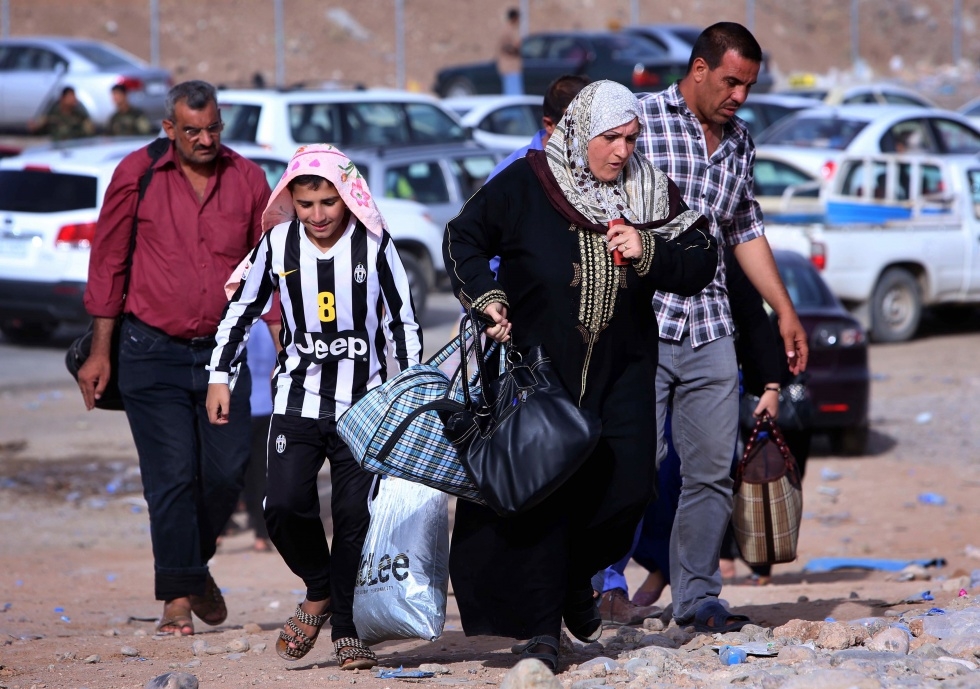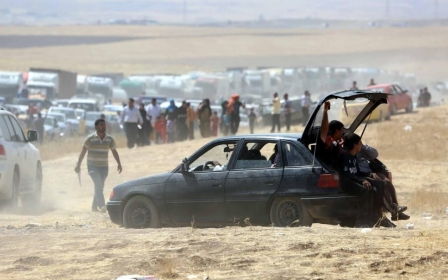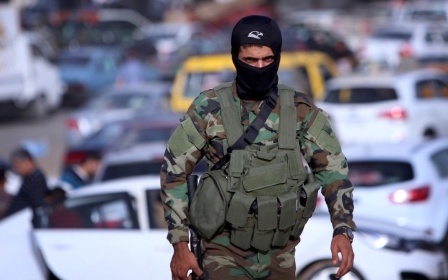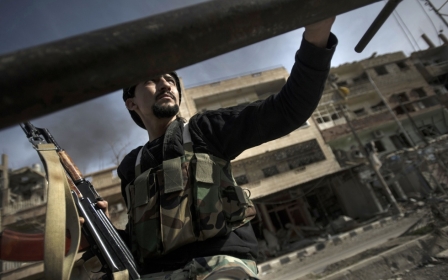Mosul residents fleeing to Erbil berate Iraqi PM

By Abdel Hamid Zibari
Thousands of people who fled Iraq's second city of Mosul after it was overrun by jihadists wait in the blistering heat, hoping to enter the safety of the nearby Kurdish region and furious at Baghdad's failure to help them.
As many as half a million people are thought to have fled Mosul, which was captured by the Islamic State of Iraq and the Levant (ISIL) Tuesday after a spectacular assault that routed the army.
At a roadblock some 40 kilometres (25 miles) from Erbil, the capital of the autonomous Kurdish region, a long line of men, women and children has been queueing under the blazing sun since morning, seeking permits allowing them stay.
As they do, the number of waiting vehicles grows.
Parents carry their smaller children, and bundles of clothes and other bare essentials that they managed to bring with them.
Hot and tired they may be, but they don't hesitate to vent their anger at Shiite Prime Minister Nuri al-Maliki.
"Come and film us, so the entire world can see the state that Maliki has reduced us to," shouts a woman among a group of others, addressing journalists at the scene.
Fear of reprisals
Accompanied by her family, Zahra Cherif, says she is terrified of the massacres that might take place if the army tries to retake the city from ISIL.
"We fear the consequences of this invasion, because if the army enters it could take revenge on the city's residents," she explains, a premonition shared by many of those who have fled.
Mosul, a majority Sunni Muslim city, has long felt marginalised by Maliki's Shiite-led government. Resentment also runs deep in other Sunni Arab places like Tikrit, the now executed dictator's hometown, which fell to ISIL on Wednesday.
The jihadist group has exploited the support of local tribes to strengthen its grip on Iraq's Sunni regions, taking control of Fallujah and parts of Ramadi in January.
Mosul, which also has smaller Christian and Kurdish communities, was a stronghold for Sunni rebels fighting American troops after the 2003 invasion, and previously provided recruits for Saddam's army and intelligence services.
Many of those fleeing are mindful of what happened in Fallujah, in the western province of Anbar. It has been pounded by the army, which is trying to force out militants who took control of the city five months ago.
Supply shortages
For now, the lack of supplies figures prominently in their decision to leave, with 10 days of fighting taking its toll on the availability of essentials.
"There are no longer hospitals or medical services," says Zahra.
But voluntary groups here provide the displaced families with water and food, while heavily armed Kurdish security forces patrol with police dogs, seeking to prevent insurgents from hiding in the crowd.
The Mosul fugitives seem disinclined to criticise the ISIL jihadists, who are supported by other militant Sunni groups.
Abu Ahmad, 60, says he saw ISIL fighters on the streets of Mosul on Wednesday morning, but they didn't cause any harm.
"The inhabitants have formed popular defence committees to protect the banks and government buildings," he adds, insisting that the only acts of vandalism have targeted army positions.
Before the jihadists overran the city, "people felt they were the target of checkpoints, arrests by the authorities and draconian security measures."
Ismail Ahmad, 50, another Mosul resident who fled Wednesday morning, says he expects to return once the city's water and electricity supplies have been restored.
Middle East Eye propose une couverture et une analyse indépendantes et incomparables du Moyen-Orient, de l’Afrique du Nord et d’autres régions du monde. Pour en savoir plus sur la reprise de ce contenu et les frais qui s’appliquent, veuillez remplir ce formulaire [en anglais]. Pour en savoir plus sur MEE, cliquez ici [en anglais].




